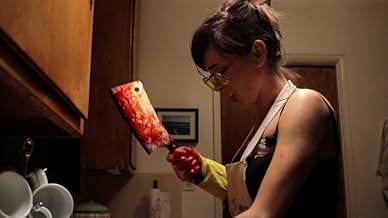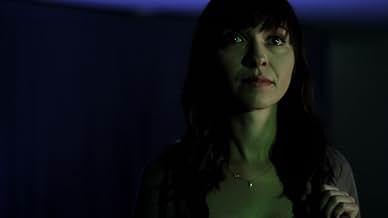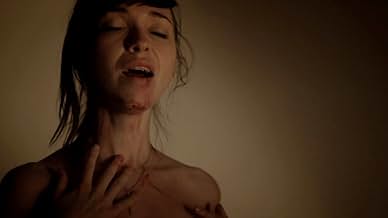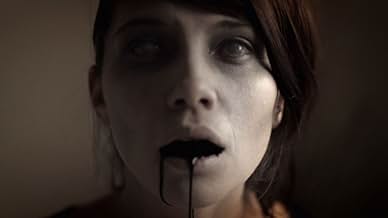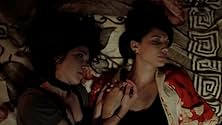VALUTAZIONE IMDb
5,4/10
3288
LA TUA VALUTAZIONE
Dopo aver picchiato brutalmente la sua migliore amica, Alyce è perseguitata dalla colpa ed entra in un incubo brutale nel paese delle meraviglie di sesso, droga e violenza.Dopo aver picchiato brutalmente la sua migliore amica, Alyce è perseguitata dalla colpa ed entra in un incubo brutale nel paese delle meraviglie di sesso, droga e violenza.Dopo aver picchiato brutalmente la sua migliore amica, Alyce è perseguitata dalla colpa ed entra in un incubo brutale nel paese delle meraviglie di sesso, droga e violenza.
- Regia
- Sceneggiatura
- Star
Amara Zaragoza
- Carroll
- (as Tamara Feldman)
Catero Alain Colbert
- Mouse
- (as Catero Colbert)
Max E. Williams
- Kurt
- (as Max Williams)
Recensioni in evidenza
I'm not gonna compare this in terms of significance with a movie by Polanski or how good/bad it is side by side to it. But there is something in there that reminded me of that one particular movie. Better to aim high, than just copying anyone I guess. The movie of course will be repulsive too. It might not turn out the way you expect it too. As other reviewers have stated, it does change pace a few times. But in my estimation it does work quite nicely.
Since I didn't read anything about the story before I watched this (as always), I was pleasantly surprised that the movie was not as simple as the cover would suggest (at least the German cover). The insanity that ensued is not without flaws and it is a bit explicit (in terms of violence), but for a low budget movie, this is really well made and acted
Since I didn't read anything about the story before I watched this (as always), I was pleasantly surprised that the movie was not as simple as the cover would suggest (at least the German cover). The insanity that ensued is not without flaws and it is a bit explicit (in terms of violence), but for a low budget movie, this is really well made and acted
After accidentally knocking her best friend off a roof, Alyce (Jade Dornfeld) is haunted by guilt and delves into a brutal nightmare wonderland of sex, drugs and violence, her mind tearing itself apart along with anyone else who gets in her way.
As others have mentioned, trying to put this film into any one genre is pretty challenging. The marketers seem to want this to be a ghost story, but that is a very small part of what really happens. Following Alyce's journey is not horror, but something a little more than drama.
The attempt to draw from "Alice in Wonderland" is strange. Clearly we have "Alyce" and her friend "Carroll Lewis", which are obvious references. We even have James Duval, who will be known by many as playing a rabbit in "Donnie Darko" (though his character here is anything but Alyce's guide). And there the similarities end.
Director Jay Lee has moved up in the world from his days (not long ago) making "Zombie Strippers". Much of this is a "really satisfying slow burn" (in the words of Nikki Hopeman), but has more to offer than just well-paced suspense. Others have made interesting comparisons, with Chuck Bowen labeling it "a blunt, trashy fusion of 'Repulsion' and 'Bartleby, the Scrivener'." Brian Tallerico was reminded of "great films like 'Repulsion' and 'May'". Unlike these two, I did not see the "Repulsion" connection, but that is a high praise.
Bowen says the film "is distinctive because Lee doesn't invite us to sympathize with Alyce; she isn't a doomed wallflower in the tradition of the heroes of Carrie, May, or many others". Quite true -- she is no hero or anti-hero, but merely the protagonist we follow, whether her path is justified or not, sane or insane. And that makes it a stronger film.
As others have mentioned, trying to put this film into any one genre is pretty challenging. The marketers seem to want this to be a ghost story, but that is a very small part of what really happens. Following Alyce's journey is not horror, but something a little more than drama.
The attempt to draw from "Alice in Wonderland" is strange. Clearly we have "Alyce" and her friend "Carroll Lewis", which are obvious references. We even have James Duval, who will be known by many as playing a rabbit in "Donnie Darko" (though his character here is anything but Alyce's guide). And there the similarities end.
Director Jay Lee has moved up in the world from his days (not long ago) making "Zombie Strippers". Much of this is a "really satisfying slow burn" (in the words of Nikki Hopeman), but has more to offer than just well-paced suspense. Others have made interesting comparisons, with Chuck Bowen labeling it "a blunt, trashy fusion of 'Repulsion' and 'Bartleby, the Scrivener'." Brian Tallerico was reminded of "great films like 'Repulsion' and 'May'". Unlike these two, I did not see the "Repulsion" connection, but that is a high praise.
Bowen says the film "is distinctive because Lee doesn't invite us to sympathize with Alyce; she isn't a doomed wallflower in the tradition of the heroes of Carrie, May, or many others". Quite true -- she is no hero or anti-hero, but merely the protagonist we follow, whether her path is justified or not, sane or insane. And that makes it a stronger film.
This Movie starts off as what appears to be a somewhat cliché and predictable Hollywood flick but given time and patience spirals out of control into a world of actual insanity. the gore and violence is superb, and this movie has its moments of dark psychotic humor. this movie belongs to the appreciators of underground entertainment, Raw and Relentless, only after the movie climbs to its peak i feel the movie ended abruptly, i would've enjoyed a darker ending but i must say the people that worked on this movie did an amazing job, i am so sick of stereotypical people giving movies unfair biased reviews because their minds have been numbed to only enjoy stereotypical diluted Hollywood crap. This movie is for real art lovers.
Stop watching, rating and reviewing horror films unless you are a fan of the genre! As a general rule, I always assume a horror film is good if it gets at least a five on IMDb. That's because you can assume most of the people rating it don't like horror, so the low ratings from the anti-horror raters are balanced out by the higher ratings from those of us who appreciate it. This is a wonderful turn on the psycho-killer sub-genre. Alyce is an attractive, somewhat withdrawn young woman who pretty much leads her life as an extension of her best friend with whom she obviously has more than a "friendly" attraction. After an evening of partying and drug use, she accidentally pushes her best friend off of a roof prompting her descent into depravity. She is obviously unbalanced from the first scene, so it is extremely believable that she is pushed over the edge herself after losing her best friend at her own hand. The rest is grisly, morbid fun. Jade Dornfeld is excellent, sexy, and extremely plausible as the crazy girl who is suddenly a drug addict, prostitute, necrophiliac, and killer all at once while developing a new sense of self-confidence. Definitely a 7 out of 10 - a must for horror fans.
With a cursory acknowledgment of the Lewis Carrol tale, Alyce is as much an entry-level clerical answer to the Fortune 500 American Psycho (2000), as it is a morbid odyssey of self discov- uh, make that self-destruction. Like a high-speed bullet train to Hell, Alyce Kills is novel, slick, and exciting, but it doesn't take us where we want to go.
Young, pert Alyce (Jade Dornfeld) toils away in a depressing corporate cubicle for a shrewish boss at a thankless job. After work she trudges home to her cramped apartment to freshen up before some much needed steam-venting at dingy nightclubs. It's not much of a life, but Alyce has her friend Danielle (Rena Owen), an alpha female who provides Alyce with a framework of guidance upon which follower Alyce proves to be reliant.
When Alyce and Danielle take the Generation X drug "ecstasy," Danielle sexually leads on Alyce. It comes out that Alyce has a crush on Danielle who then rejects her.
Is it an accident then when Alyce "accidentally" pushes her off the roof a short while later? It's not clear whether Alyce is vindictive and a little crazy, or merely reckless, and irresponsible. Danielle stands on the ledge, tempting fate, Alyce mock-pushes her. Alyce is playing a game and behaves as if she doesn't intend the result -Danielle's dive to the pavement. But Alyce definitely intends to make contact, and under the circumstances it's no surprise when Danielle plunges to her doom.
Despite that it led to tragedy, Alyce decides she likes ecstasy and trades sex for the drug from a repulsive dealer. Under the influence of the psychedelic, Alyce locks herself in her apartment for marathon-length trips during which she perpetually masturbates to violent videos. Conniving to obfuscate her complicity in Danielle's misfortune leads Alyce to take increasing risks until she pulls out all the stops. Traipsing across an urban landscape of bizarre characters, settings and situations, Alyce taunts the family of her victim, and eventually conspires bloody murder against those who annoy and inconvenience her.
Having now lost Danielle's boundary-defining structure, Alyce's fragile veneer of sanity falls away like an uncoupled caboose from a speeding express. Her locomotive throttle is wide open and there's no engineer in the cab. Alyce resolves to take charge of her own life, but her brand of self-assertive, feminist "empowerment" is to embark upon a self-indulgent journey of risky behavior. Yet it's more like a spree, and it degenerates into a maelstrom of self destruction, dragging those closest to her along for a hell-ride on her crazy train.
The theme of women scheming against men has been around at least since ancient Greece. From Aristophanes' Lysistrata, to the Biblical Eve convincing Adam to bite the proverbial apple, we've seen versions of the femme fatale in various literary incarnations through the ages. A few include Shakespeare's Lady Macbeth, and Cleopatra, Daniel Defoe's opportunistic Moll Flanders, Oliver Goldsmith's lighthearted, scheming, Katie Hardcastle in his 1773 play, She Stoops To Conquer, the conniving Matilda in Matthew Gregory's 1796 supernatural Gothic novel The Monk: A Romance, and the malevolent man-hater, Miss Havisham in Charles Dickens' Great Expectations.
Whereas these feminine plotters employed cunning and sexual manipulation to achieve their aims, their modern counterparts resort to brute force. The concept of the fairer sex outwitting men has evolved into the myth of womens' domination over men, and convoluted orchestrations have given way to the karate kicks and machine guns used by characters such as secret agent Emma Peel (Diana Rigg; Uma Thurman in the 1998 film version) in BBC's The Avengers, to Max Guevera (Jessica Alba) in TV's Dark Angel, and La Femme Nikita (Anne Parillaud; Bridget Fonda in the US remake). The latest trend has dark-psyched vixens engaging in just plain psychopathic killing sprees.
Alyce's quirky, but undeveloped character may be inspired by the leads in May (2002), and Neighbor (2009), two similar stories about loner hellcats who indulge their necrophilic and cannibalistic urges through acts of violence. Yet May (Angela Bettis), the film's namesake, commits her violence via a misguided search for an similarly misfit mate. In Neighbor, "The Girl," (America Olivo) thrill-kills for the sheer sadistic pleasure of it, making a living by robbing her victims and using their homes like motels.
Alyce however, lacks any sensible or even cognizant motivation at all. Her deeds defy logic, her methods are unsound, and Alyce's lack of planning is sure to bring her only more trouble. We're not sure if even she understands her actions. This makes her singularly one dimensional.
It's a profound disappointment, too. What's engrossing about Alyce's sexy character is not what she does, but the wry way she does it with her distinctively iconoclastic demeanor. It's not the revulsion inherent to her wanton acts of sex and violence that catches our attention, but the manner in which her smug, witty bearing holds out the promise of a satisfying payoff. We keep waiting to tumble into an epiphany of insight into her disturbed psyche, or at least some commentary about human nature or revenge. It never happens, and we're left feeling like the lone passenger on a runaway train with no destination in sight, and no emergency pull-cord to stop the projector.
Young, pert Alyce (Jade Dornfeld) toils away in a depressing corporate cubicle for a shrewish boss at a thankless job. After work she trudges home to her cramped apartment to freshen up before some much needed steam-venting at dingy nightclubs. It's not much of a life, but Alyce has her friend Danielle (Rena Owen), an alpha female who provides Alyce with a framework of guidance upon which follower Alyce proves to be reliant.
When Alyce and Danielle take the Generation X drug "ecstasy," Danielle sexually leads on Alyce. It comes out that Alyce has a crush on Danielle who then rejects her.
Is it an accident then when Alyce "accidentally" pushes her off the roof a short while later? It's not clear whether Alyce is vindictive and a little crazy, or merely reckless, and irresponsible. Danielle stands on the ledge, tempting fate, Alyce mock-pushes her. Alyce is playing a game and behaves as if she doesn't intend the result -Danielle's dive to the pavement. But Alyce definitely intends to make contact, and under the circumstances it's no surprise when Danielle plunges to her doom.
Despite that it led to tragedy, Alyce decides she likes ecstasy and trades sex for the drug from a repulsive dealer. Under the influence of the psychedelic, Alyce locks herself in her apartment for marathon-length trips during which she perpetually masturbates to violent videos. Conniving to obfuscate her complicity in Danielle's misfortune leads Alyce to take increasing risks until she pulls out all the stops. Traipsing across an urban landscape of bizarre characters, settings and situations, Alyce taunts the family of her victim, and eventually conspires bloody murder against those who annoy and inconvenience her.
Having now lost Danielle's boundary-defining structure, Alyce's fragile veneer of sanity falls away like an uncoupled caboose from a speeding express. Her locomotive throttle is wide open and there's no engineer in the cab. Alyce resolves to take charge of her own life, but her brand of self-assertive, feminist "empowerment" is to embark upon a self-indulgent journey of risky behavior. Yet it's more like a spree, and it degenerates into a maelstrom of self destruction, dragging those closest to her along for a hell-ride on her crazy train.
The theme of women scheming against men has been around at least since ancient Greece. From Aristophanes' Lysistrata, to the Biblical Eve convincing Adam to bite the proverbial apple, we've seen versions of the femme fatale in various literary incarnations through the ages. A few include Shakespeare's Lady Macbeth, and Cleopatra, Daniel Defoe's opportunistic Moll Flanders, Oliver Goldsmith's lighthearted, scheming, Katie Hardcastle in his 1773 play, She Stoops To Conquer, the conniving Matilda in Matthew Gregory's 1796 supernatural Gothic novel The Monk: A Romance, and the malevolent man-hater, Miss Havisham in Charles Dickens' Great Expectations.
Whereas these feminine plotters employed cunning and sexual manipulation to achieve their aims, their modern counterparts resort to brute force. The concept of the fairer sex outwitting men has evolved into the myth of womens' domination over men, and convoluted orchestrations have given way to the karate kicks and machine guns used by characters such as secret agent Emma Peel (Diana Rigg; Uma Thurman in the 1998 film version) in BBC's The Avengers, to Max Guevera (Jessica Alba) in TV's Dark Angel, and La Femme Nikita (Anne Parillaud; Bridget Fonda in the US remake). The latest trend has dark-psyched vixens engaging in just plain psychopathic killing sprees.
Alyce's quirky, but undeveloped character may be inspired by the leads in May (2002), and Neighbor (2009), two similar stories about loner hellcats who indulge their necrophilic and cannibalistic urges through acts of violence. Yet May (Angela Bettis), the film's namesake, commits her violence via a misguided search for an similarly misfit mate. In Neighbor, "The Girl," (America Olivo) thrill-kills for the sheer sadistic pleasure of it, making a living by robbing her victims and using their homes like motels.
Alyce however, lacks any sensible or even cognizant motivation at all. Her deeds defy logic, her methods are unsound, and Alyce's lack of planning is sure to bring her only more trouble. We're not sure if even she understands her actions. This makes her singularly one dimensional.
It's a profound disappointment, too. What's engrossing about Alyce's sexy character is not what she does, but the wry way she does it with her distinctively iconoclastic demeanor. It's not the revulsion inherent to her wanton acts of sex and violence that catches our attention, but the manner in which her smug, witty bearing holds out the promise of a satisfying payoff. We keep waiting to tumble into an epiphany of insight into her disturbed psyche, or at least some commentary about human nature or revenge. It never happens, and we're left feeling like the lone passenger on a runaway train with no destination in sight, and no emergency pull-cord to stop the projector.
Lo sapevi?
- QuizThe titular character is named Alyce(Alice) and her best friend is named Carol Lewis (Lewis Carroll in reverse). Lewis Carroll wrote the novel Alice in Wonderland about a girl going down a rabbit hole, much like how Alyce descends into madness due in part to Carol Lewis.
- ConnessioniReferences Casablanca (1942)
- Colonne sonoreCrazy Loco
Written by Nate Hertweck & David Bowick
Performed by Ocelot Robot
Wood and Lead (ASCAP)/Razorface (ASCAP)
I più visti
Accedi per valutare e creare un elenco di titoli salvati per ottenere consigli personalizzati
- How long is Alyce Kills?Powered by Alexa
Dettagli
- Tempo di esecuzione1 ora 30 minuti
- Colore
- Proporzioni
- 1.85 : 1
Contribuisci a questa pagina
Suggerisci una modifica o aggiungi i contenuti mancanti



